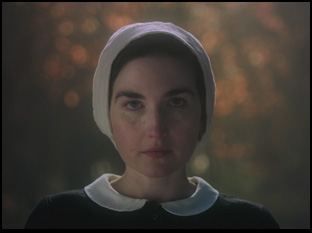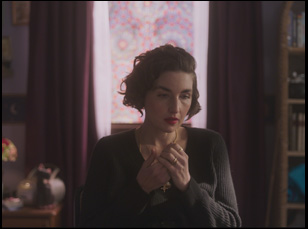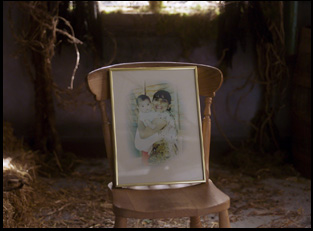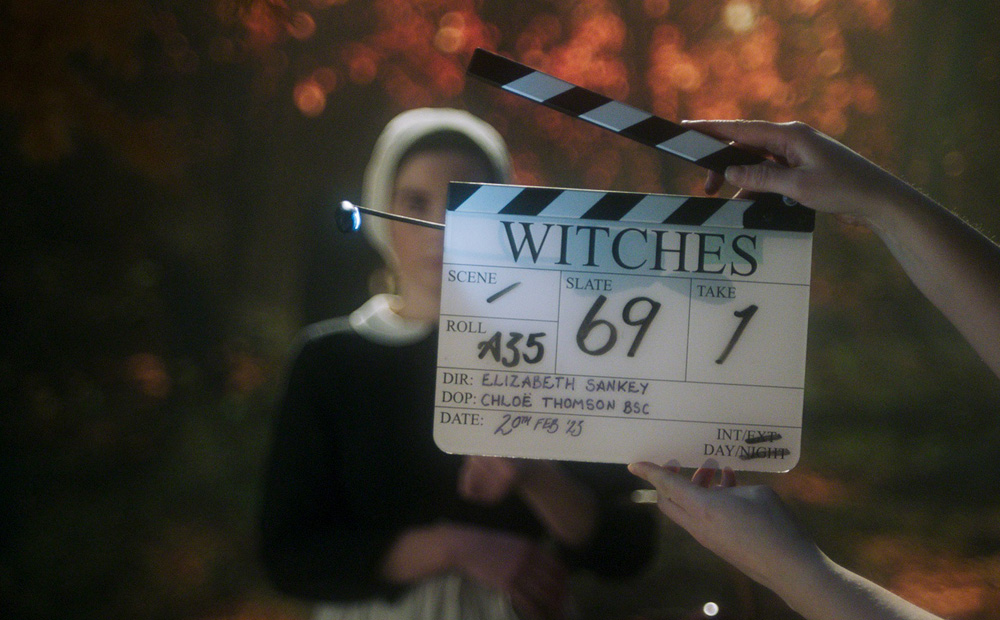Even if Elizabeth Sankey didn’t confess that she had aspirations as a child towards the title occupation in her introduction for “Witches,” you would know by now that she knows how to cast a spell. In some ways, it’s necessary when competing with the persuasive power that decades of films have had on shaping popular consciousness, brought into stark focus in her disarming debut feature “Romantic Comedy,” in which the director corralled a group of cultural commentators her age to pick apart various examples from the genre to show the impact they’ve had in shaping behavior and power dynamics beyond the screen in as charming terms as the films they dissected.
When movies can often act as the only frame of reference for situations that are unfathomable otherwise, it is only natural that Sankey turned to them once more after a harrowing bout of postpartum depression, with “Witches” emerging from the experience of checking herself into a psychiatric ward after she initially felt no attachment to the child she gave birth to. There were plenty of movies to show that as difficult as the preceding nine months could be, she would be inevitably overwhelmed with joy once the baby arrived, but few that depicted the indifference she actually felt and she was led to make a corrective of sorts, now deeply in love with her son and on stable footing again, yet hardly having an easy road to get there.
Sankey once again starts out facilitating a conversation about what’s largely been unsaid in the form by using the lingua franca of movie clips, relaying her own anxieties as if she were the notoriously frantic Isabelle Adjani in “Possession” and contrasting it with the far more adorably nervous Julianne Moore in “Nine Months.” But “Witches,” which explores a genre predicated on the mistaken identities of women whose pent-up emotions led them to be branded as hysterical or heretics, opens up in a beautiful way when Sankey emerges from behind the camera to share her story and comes to include the women that she leaned on as she struggled with becoming a new mother, with members of the Motherly Love support group in the U.K. describing both in an emotional and practical sense the difficulties of adjusting to an entirely new life. The stylistic break from Sankey’s previous visual essay format is refreshing within the context of her own work, but makes as much of an impact if not more within the medium itself when the startlingly frank and vulnerable discussion of such issues regarding motherhood rarely receives this kind of forum and as the film reconsiders women vilified in both movies and real life, such as Dr. Daksha Emson, who took her own life and that of her child shortly after she was born as a likely result of psychosis she kept to herself, the space to have these conversations appears especially precious.
After premiering earlier this year at Tribeca, “Witches” is finding its way into homes worldwide with its debut this week on MUBI and Sankey graciously took the time to talk about how making the film ended up helping her through a tough time and her hopes that it could do the same for others, as well as strengthening her distinctive filmmaking style and how her own perspective on certain films has changed with the experiences she’s had.

It just made sense to me. It’s hard for me to remember my logic completely, but it felt like such a natural choice. I really needed to find a way to process what had happened to me and also to not feel bad about it anymore and to embrace it. My therapist had said the best way to do that is to talk about it, and I thought, “This is a great opportunity to talk to other women who’ve been through similar experiences and it was a very interesting opportunity for me to talk as someone who has gone through a mental health crisis like that, who has been in a psychiatric ward.” Most people who’ve had that happen to them do not have the opportunity or the capacity to make a film about their experience, so I felt there was a responsibility to show people that this is what that experience is like, and to demystify it. But mainly it was a selfish choice because it was about catharsis and processing for me.
It was interesting to consider this as a follow-up to “Romantic Comedy” since it seemed in that film that you were edging towards putting yourself out there in a personal way, and I wondered whether that experience emboldened you to make something so intimate as “Witches”?
I’m sure it did. I think I also knew how to construct a film essay [where] I knew about fair use and how I could use film clips, so that was really helpful, especially because I started making “Witches” when I was still very much in recovery. I like to say that it’s a film made by a mad woman because I was still not very much in my right mind, so that was a big, big influence on it.
In “Romantic Comedy,” you stayed behind the camera to narrate and participants were off-screen as well. Was that much of a decision this time around to ?
Originally, it was just going to be a film essay because I just wanted to sit down and make it from beginning to end [without] waiting for funding or get anyone’s permission. Then MUBI came on board and they were so brilliant and gave us some money, so it became “Okay, this could be really cool.” I had the idea of building the sets and doing some filmed interviews. And because I would be asking other women to tell their stories on camera, it just made sense for me to do the same thing.

Yeah, when I first started this, I made a huge list of which films from all around the world that I hadn’t seen before, but also things that I had and it was very interesting to me watching a film like “The Wizard of Oz” where suddenly I was like, “God, Glinda is kind of awful actually, the way that she talks about like good and bad witches and the idea that only bad witches are ugly.” I was watching the films out of the context that they’re supposed to be watched and I was finding moments and scenes and images that really resonated with me, separating them from their narratives and looking at these women that were supposed to be scary and thinking actually she’s really powerful and that’s really strong. That was a good place for me to put my focus and my attention right now because I thought I’m not going to be a good mother, but maybe I could be a powerful woman in a different way. So I was definitely seeing them all in a very new light.
This is no less an incisive piece of film criticism, but “Romantic Comedy” tended to hone in and really interrogate moments from various films whereas the images and scenes here are generally used for illustration and how pop culture can shape a person’s perception of what’s happening to them. Was your relationship to them different in putting this together?
Yeah, with “fair Use” as well, you have to be really careful. You can’t just use films as B-roll, so I couldn’t just have clips [as illustration]. They did always have to be linked back, but that was a really good fit actually. By their very nature, films that depict witches are a commentary on the way that we see women in society. So I was definitely saying, “Oh, and in “The Craft” they portray the witches like this,” but much more letting the film speak for themselves whereas in “Romantic Comedy,” it had been much more criticizing them overtly. But the way that I use them in “Witches” to me feels perhaps even more significant or even stronger a criticism because it isn’t so on the nose. You’re watching these women, thinking “Wow, this is just something that we have had fed to us forever.” For me, it was quite revelatory, so I hope that comes through in the film.
It did for me. Was there anything that happened that changed your ideas of what this could be?
Yeah, I had a very, very clear idea of what the film was going to be and I worked on a script with that in mind and what we were going to cover and who I was going be interviewing. We’d filmed all the interviews and I had done a first cut of the film based on that script and we watched it and it just wasn’t working. And the shift that needed to happen was actually for me to center my story more, make that the narrative throughline of the film and build a three-act structure around that whereas previously I’d been putting in a lot more academic and historical conversations and research. That was a blind spot for me because I was editing myself and it was very hard for me to know if what I was saying was interesting or pertinent enough and it took somebody else to say, “No, no, no, you need to keep this through.” I had a consulting editor called Davis Coombe, who’s brilliant and had edited one of my favorite documentaries, “Casting JonBenet,” and he watched the film and said to me, “Look, you need to think of yourself as a character distinct from you in the film and use that to find your way through the film. It’s not you anymore, it’s a character.” That really, really helped.

It’s been really fantastic. We’ve had so many incredible responses, not just from mothers, but also from women who don’t want to have children who will say, “Okay, this is confirming what I’ve been feeling already that this is not a path that I want to go down.” And I think that’s really great because there’s so few depictions in popular culture and Western culture of women who don’t have children. That’s just not something we really see as much. There’s also been some really lovely responses from men who are saying it’s making them think about their own mothers, or partners, and it’s been surprising how many people it’s connecting with, regardless of whether or not they themselves are parents or mothers or even women. That’s been really, really special, and after the American election in particular, there’s been a slightly more charged response from some people, which is interesting.
“Witches” starts streaming on MUBI on November 22nd.




